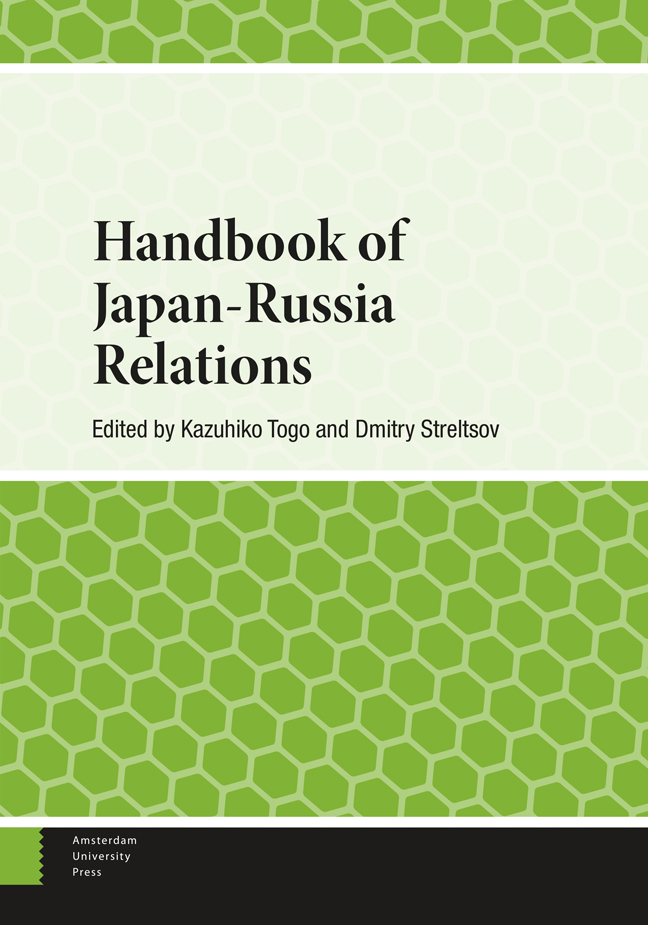Book contents
- Frontmatter
- Contents
- Dedication
- Acknowledgements
- Contributors
- Abbreviations
- Introduction
- Part 1 War and Peace: Diplomatic Relations and Security
- Part 2 Territory
- Part 3 The Economy and Energy
- Part 4 Disaster Cooperation
- Part 5 Culture
- Part 6 Perceptions of the Other
- Appendix 1 1956 Joint Declaration
- Appendix 2 Tokyo Declaration (1993)
- Appendix 3 Moscow Declaration (1998)
- Appendix 4 Irkutsk Statement (2001)
- Appendix 5 Foreign Ministry Statement (2022)
- Index
16 - Japan’s Perceptions of Russia
Published online by Cambridge University Press: 26 March 2024
- Frontmatter
- Contents
- Dedication
- Acknowledgements
- Contributors
- Abbreviations
- Introduction
- Part 1 War and Peace: Diplomatic Relations and Security
- Part 2 Territory
- Part 3 The Economy and Energy
- Part 4 Disaster Cooperation
- Part 5 Culture
- Part 6 Perceptions of the Other
- Appendix 1 1956 Joint Declaration
- Appendix 2 Tokyo Declaration (1993)
- Appendix 3 Moscow Declaration (1998)
- Appendix 4 Irkutsk Statement (2001)
- Appendix 5 Foreign Ministry Statement (2022)
- Index
Summary
Geographically, Russia is Japan’s closest neighbor. This geographical proximity, however, is not reflected in the political, economic and other sets of relations between the two countries. Japan and Russia are yet to conclude a peace treaty that would end the abnormal state of relations that has existed between them since the end of World War II and the term “distant neighbors” coined more than two decades ago is still applicable to describing the state of bilateral relations. This chapter is devoted to exploring Japan’s perceptions of Russia. It will briefly touch on the way the Japanese viewed Russia in the 18th, 19th, and early 20th centuries though its main focus is on the postwar period. It will show that in addition to broad, structural factors such as the Cold War, Japan’s self-perception in relation to the West as well as domestic political and cultural trends played an important role in shaping these perceptions.
Introduction
Geographically, Russia is Japan’s closest neighbor. Even if one ignores the disputed islands, the closest of which is located only two miles from Hokkaido’s Cape Nosappu, the distance between Sakhalin’s Cape Crillon and Hokkaido’s Cape Sōya is a mere twenty-eight miles (45km). This geographical proximity, however, is not reflected in the political, economic and other sets of relations between the two neighbors. Japan and Russia are yet to conclude a peace treaty that would end the abnormal state of relations that has existed between them since the end of World War II and the term “distant neighbors” coined more than two decades ago is still applicable to describing the state of bilateral relations.
This chapter is devoted to exploring Japan’s perceptions of Russia. It will briefly touch on the way the Japanese viewed Russia in the 18th, 19th, and early 20th centuries though its main focus is on the postwar period. It will show that in addition to broad, structural factors such as the Cold War, Japan’s self-perception in relation to the West as well as domestic political and cultural trends played an important role in shaping these perceptions.
Before proceeding further, we should briefly address the most important methodological question which arises whenever one seeks to explore nation-level perceptions, namely, whose perceptions exactly are we focusing on and why.
- Type
- Chapter
- Information
- Handbook of Japan-Russia Relations , pp. 292 - 307Publisher: Amsterdam University PressPrint publication year: 2024



